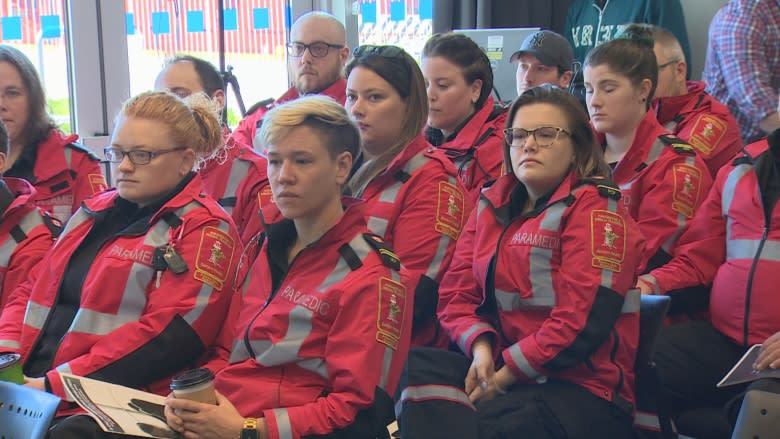Union calls for legislation to support workers with mental health injuries
The Newfoundland and Labrador Association of Public and Private Employees wants provincial legislation to give workers with mental health injuries the benefit of the doubt.
The union released a position paper Tuesday on legislation for mental health compensation.
"Unfortunately, Newfoundland and Labrador lags behind the other provinces when it comes to legislation in this area," said NAPE president Jerry Earle, before a room of first responders.
NAPE commissioned the paper after WorkplaceNL, the provincial organization that oversees worker safety, began reviewing its stress compensation policies in November.
"What we wanted to do with this paper was to ensure that we get it right — for all workers across the province, not just for a select group of workers, or just our members," said Earle.
Professors Rosemary Ricciardelli and Alan Hall of Memorial University prepared the document, which includes a review of policies across Canadian provinces and recommendations for the government.
The report notes many workers in Newfoundland and Labrador who suffer from some kind of a workplace psychological injury don't file for compensation. If they do, their claims tend to be rejected.
"Removing the barriers to reporting is absolutely essential. Certainly, the recommendations that we're presenting here are aimed principally at that," said Hall.
Ricciardelli emphasized the inclusiveness of their proposal. While much attention has been paid to the prevalence of PTSD in first responders, she added that mental injury isn't limited to one disorder or one group.
"Not all trauma — cumulative or acute — result in PTSD, and we need to change that dialogue. That trauma can result in many other major mental disorders and other experiences," she said.
"Even if we move outside of the public safety realms, what happens at work and the unexpected that can happen needs to be recognized across the board."
The key recommendations:
- Include all mental injuries resulting from chronic stress.
- Recognize mental injury caused by both cumulative and single incidents.
- Be presumptive and give the benefit of the doubt to the worker.
- Limit how diagnosed psychological injuries can be challenged.
- Don't draw a dividing line between work life and personal life regarding mental health.
- Cover mental health injuries that occurred before the bill's proclamation.
Workplace NL developments
In November, WorkplaceNL Minister Sherry Gambin-Walsh issued a review of the province's work-related mental stress compensation policies.
Workplace NL opened the review up to the public, accepting feedback until March, when the provincial government expanded legislation to recognize cumulative stress exposure as a claimable psychological injury. In the past, workers had to identify a specific traumatic incident when making mental health claims.
NAPE's hope is that WorkplaceNL will take Ricciardelli's and Hall's findings and recommendations under advisement to create a progressive piece of legislation and set a new national standard.
"We don't need small changes," said Earle. "We need massive changes in how we approach mental health in the workplace."
Read more from CBC Newfoundland and Labrador




